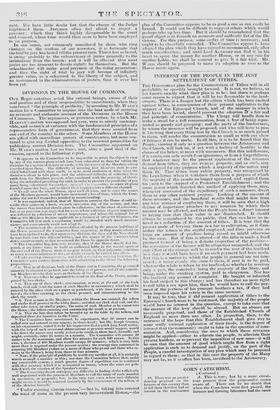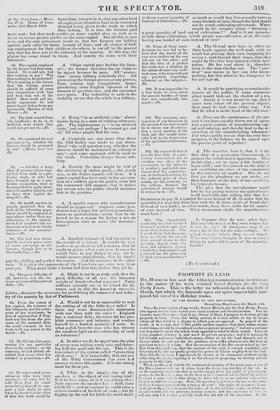CORN CATECHISM.
(Continued.)
RS. There was no greater delusion practised on the farmers of this country than to tell them that they had an- interest in the continuance A. This is true; but by a more circui- tous process than the propounder seems aware of. ('here can be no doubt that when the Corn-laws were first passed, the farmers and farming labourers bad the same of the Corn-laws.— Morn- immediate interest in it, that any other kind ing P.st. House of Coot- of enip/o.egs or labourers have in an increased mons, 21st March 1834. demand being given to the trade to which they belong. It is true the farmers paid more rent ; but they made -profits on more capital also, as well as in many instances greater profits on the same capital. But all this is over new, and the only permanent result is, that five farmers are bidding against each other for farms instead of four ; and all chance of find- ing employment for their children elsewhere, is cut off by the general stop that has been put to the industry of the country. In this way, the plague has come round to them. And exactly the saute with their labourers.
89. The capital employed by the farmer had been Meg - tioned. lie would ask, had that nothing to pay ? Was that nothing to be protected ? Was it nothing to the farmer that the foreign grower should be suffered to come into competition with hint and beat him out of the field ? More weak and im- becile arguments he had never heard before from any honourable Member of that House. —lie • 90. The debt caused. them [the landlords] to be in an artificial state which they could not get out of.—/b.
91. He considered the real question to be, whether the farmers should be protected or not ? Hear, hear 92. — whether a large class of persons whose capi- tal had been sunk in a par- ticular trade, or who had been brought up to a par- ticular occupation, were to be compelled to apply them- selves to another pursuit, and to have their capital de- stroyed ?-16.
93. He would say that he greatly preferred that the bulk of the labouring popu- lation should be employed in agriculture rather than ma- nufactures, as the agricul- turist b ul comforta and en- joyments which were wholly unknown to the manufac- turer.—/b.
94. The fact was incon- t estible that low prices were of more advantage to the farmers, though less so to the landholder.—lit. A. Other capital pays besides the farm- er's; the farmer therefore has no claim to be unjust because he pays. All "protec- tion." means robbing somebody else. All preventing the foreign grower,or any grower, from coining into competition, means plundering some English labourer of the amount in question once, and the consumer over again. The imbecility is only in the inability to see that the whole is a robbery.
A. Being " in an artificial state," always means being in a state of robbing other peo- ple. The highwayman is " iu an artificial state," and one perhaps " be cannot get out of," till other people find the way.
A. Certainly not ; any more than those the Old Bailey was made to put down. Read " the real question was, whether the farmers should be maintained in rubbery or not,"—and some approach will be made to the truth. Protection always means- rob- bery.
A. Exactly the same might be said of the receivers of stolen goods,—the play men, as the Police reports call them. If a man's capital bas been sunk in the prosecu- tion of a robbery upon the public, none but the concerned will suppose that it makes any reason why the public should maintain hint in the practice.
A. A special reason why munufacturers should be oppressed ! Suppose some gen- tleman had a fancy for preferring manufac- turers to agriculturists; would that be al- lowed to be a reason for laying a tax on home-grown corn to serve the manufac- turers?
95. The great difficulty of all, however, was the nn- mense pressure of the national debt.—A.
96. From the extent of her capital, the industry of her labourers, and the enter- prise of her merchants, he was of opinion that if Eng- land was free from the pre- sence of the national debt, she could compete in free trade with any nation in the world.— lb. • 97. He did not claim pro- tection for any particular class in the country ; on the contrary. he had already ad- mitted that every class Wit.% entitled to protection.—Ib.
98. He represented a con- stituency who were large consumers of corn, but he told them that he could never bring himself to sup- port a free trade in corn when he knew that the effect of that free trade would be A. Would it not be as reasonable to wait for cutting of all the little dogs' tails ? Is there any more demonstrable connexion with one than with the other ? England has a national debt ; therefore let her pro- hibit commerce and industry, and confine herself to a limited quantity of corn. In what parish lives the man who has thrown the smallest light on the rationality of such an inference?
A. In other wads, he approhates the plan of every man robbing every non and throw- ing half the spoil into the sea. This is the true nature of the system called "protecting all classes." It is remarkable, that not one of the Whig Government 1 as ever hi.d courage to state this point. It is too strong meat for them yet.
A. What, in the imagie:e ion of the speaker, is the object of cultivating land? Is it to have corn; or is it sot, telling else ? Now suppose the speaker hail il field, from which by a certain expense he could raise a certain number of bushels of corn,—but by digging up the soil for bricks he could make to throw a great :quantity of as much as would buy hint atonality twice as laud out of cultivation.—lb. many bushels of corn, though the land should
not be worth cultivating afterwards. Where
would be his scruples about " throwing a a great quantity of land out of cultivation ? " And is it not nonsense to talk about cultivation, which means non-cultivation, or at all events having one bushel of corn instead of two?
99. From all these consi- derations he was led to be- lieve that the merits of the case were neither on the one side nor on the other; and that the idea of a perfect free trade was a chimera in the minds of some very well- read men, who WEI° without any practical knowledge whatever on the subject.— lb.
100. It was impossible for a free trade to exist unless the present burden of taxa- tion was considerably lea- seed.—/b.
101. The necessary con- sequence of any alteration in the present Cot it-laws would be to throw out of cultiva- tion a great portion of the land, and this would natu- rally lead to the destruction of the agricultural labourers. —lb.
102. Ile conceived that it was the first duty of a pm • tecting, Goverment not to sacrifice one class of the community to the interests of another ; and be felt con- vinced that the manufactu- rer, so far from benefiting by the reduced price of cunt, would, on the contrary, be the sufferer, because the agricultural interest would be ruined by it.-16. A. The assertion lucre is, that it is the first duty of a protecting Government, to protect the robber that is uppermost. Give its fair play; set its upon a fair footing to begin with ; and then preach on the duty of not sacrificing one class of the community to the interests of another. But do not first set the plunderer on our necks, and then harangue on the duty of not siterifieiit: his interests to ours. A. The ill-read wen have so often IUD their heads against the well-read, with no result but proving their own incapacity for seeing a yard beyond their noses, that they might by this time have learned a little hesi- tation. He has read about it ; therefore trust to the man who has not. The " prac- tical" man means in fact one who knows: nothing, but that when he has fourpeuce lie has got a great.
A. It would be gratifying to considerable masses of the public, if some courteous ghost would blab out the shadow of a rea- son. Surely it is not meant to say, that if taxes were taken off the present objects, they must be laid sumac other way. Can that be what is iu the head of the rich men ?
A. Does not the continuance of the pre- sent Corn-laws equally throw out of opera- tion a great portion of manufacturing capi- tal mud industry, and thereby lead to the de- struction of the manufacturing labourers ? For what earthly reason that has ever been assigned, is the balance to be stayed upon the precise point of injustice ?
The plea that the manufacturer would lose by not paying mere to the agriculturist, is all resolvable into telling him that it is his interest to pay 2/. a quarter for corn instead of 21., in order that the agriculturist may buy from him with the at. three yards of broad doll? instead of two yards ; in other words, have three yards for his quarter of corn instead of two. What uncommon skulls the manufacturers must have !
103. Our importation could only he a few hundred thous:toil quarters per year more than at present. \Vas it at all likely tisat these na- tions wenhl, fr o the sake of their several shares in this depart fiont the close awl exclusive system which they had adopted ;Ind perfected fit,• the protection of their own manufactures?
—lb. A. Suppose they do not ; what thee ? Has tiny:only asked to buy corn longer than it can be ,cot? If foreigners stop it, Si much the better for the corn. robbers. We tiskid to house where they do not stop ie. Who %you'd have thought, it was so easy a thing, to make old women of the manufac- turers ?
(To le continued.)

















 Previous page
Previous page